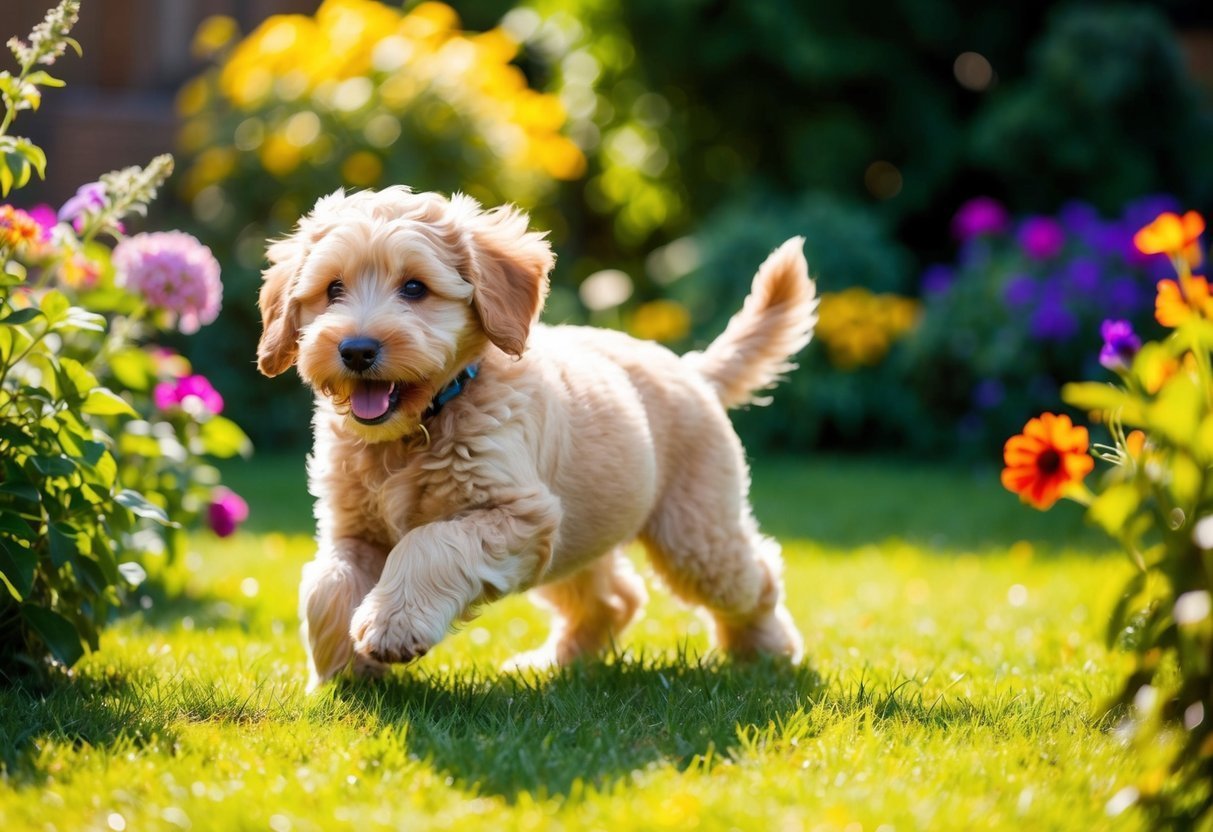Goldendoodles are a popular and lovable breed known for their friendly nature and playful spirit.
If you’re thinking about bringing one into your home, understanding their growth can help you provide the best care possible.
Knowing the key factors that influence your Goldendoodle’s growth will ensure you help them reach their full potential.
From puppyhood to adulthood, each stage brings its own challenges and joys.
It’s important to be informed about what to expect as your furry friend grows.
You’ll want to learn about their nutrition, exercise needs, and overall development to keep them healthy and happy.
Puppy Nutrition Tips
Feeding your Goldendoodle puppy the right diet is key to their growth.
Start by choosing high-quality puppy food.
This food should have a good balance of proteins, fats, vitamins, and minerals.
Puppies have different nutritional needs than adult dogs.
They need more calories and protein to support their rapid growth.
This means looking for a formula that lists meat as the first ingredient.
During the first few months, you should feed your puppy 3-4 meals a day.
This helps them get the energy they need.
As they grow, you can reduce this to 2-3 meals daily.
Be careful with portion sizes.
Too much food can lead to rapid weight gain, which isn’t healthy.
Monitor their weight and adjust the amount you feed accordingly.
Fresh water should always be available.
Hydration is important for their overall health.
If you’re unsure about the best food, consult your vet for recommendations tailored to your puppy’s needs.
Pay attention to your puppy’s energy levels.
If they seem sluggish or overly energetic, it might be time to rethink their diet.
A proper diet supports a happy and healthy Goldendoodle.
Exercise Routines for Growth
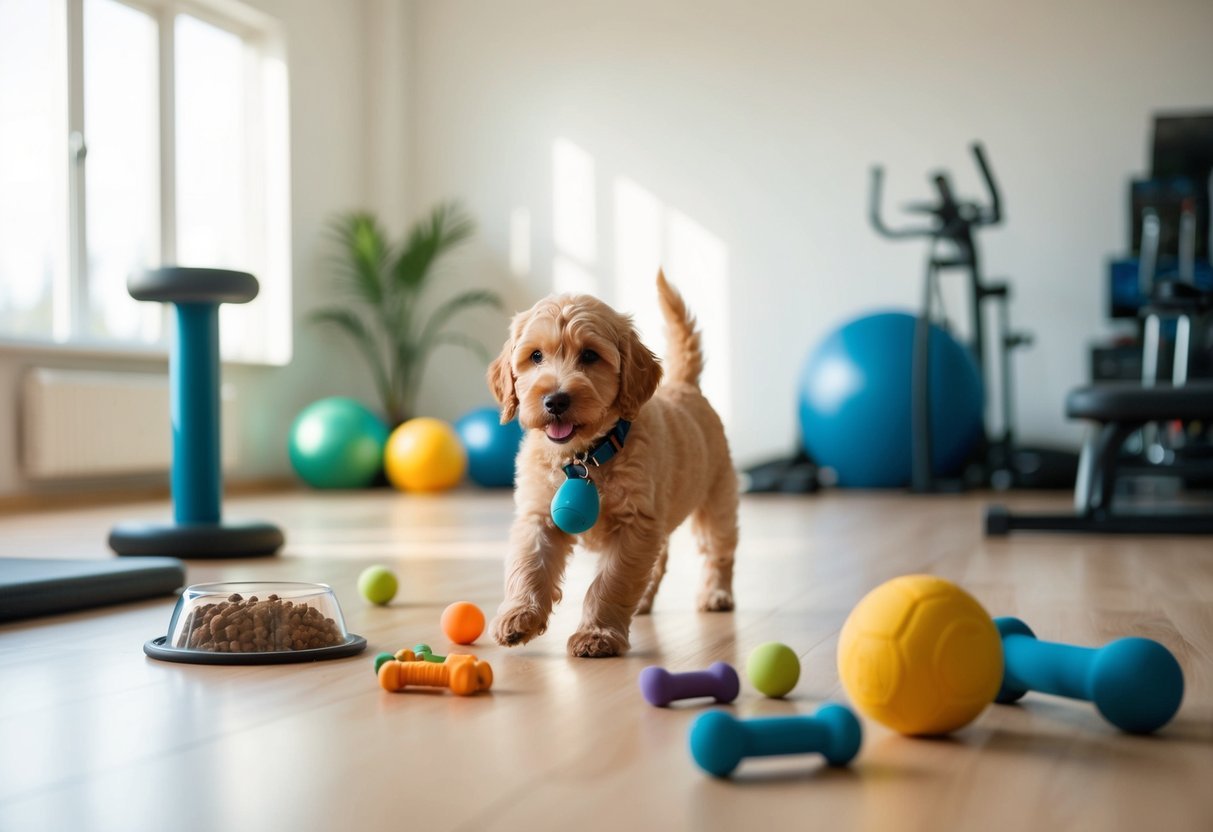
Getting your Goldendoodle to exercise is key for healthy growth.
Active pups not only build strong muscles but also keep their energy levels in check.
For puppies, short play sessions work well.
Try 5 to 10 minutes of playtime for every month of age.
For example, a three-month-old pup can handle about 15 to 30 minutes of play.
As they grow, increase their exercise routine.
Adult Goldendoodles need about 30 to 120 minutes of activity each day.
This can include walks, fetch, or even swimming.
Mixing up activities keeps your dog interested.
Try taking them to a dog park or setting up playdates with other dogs.
Don’t forget about mental stimulation! Engaging games and tricks can help your Goldendoodle stay sharp and happy.
Remember to watch for signs of fatigue.
If your pup looks tired or overheated, give them a break.
Keeping a good balance of exercise will help your Goldendoodle thrive as they grow.
3) Socialization Secrets
Socializing your Goldendoodle puppy is super important.
Start this process early, ideally between 7 and 16 weeks old.
This is when your puppy is most open to new experiences.
Expose your puppy to different people, animals, and places.
This helps them become confident and well-adjusted.
If they miss this, they may develop fear or anxiety.
Use positive reinforcement during socialization.
Treats and praise go a long way in encouraging good behavior.
Reward them when they remain calm around new experiences.
Make it a fun adventure! Take your puppy to parks, pet-friendly stores, or even a friend’s house.
Each new outing is a chance for them to learn and grow.
Lastly, remember to be patient.
Every puppy is different and learns at their own pace.
Keep socializing throughout their life to help them stay friendly and adaptable.
Importance of Grooming
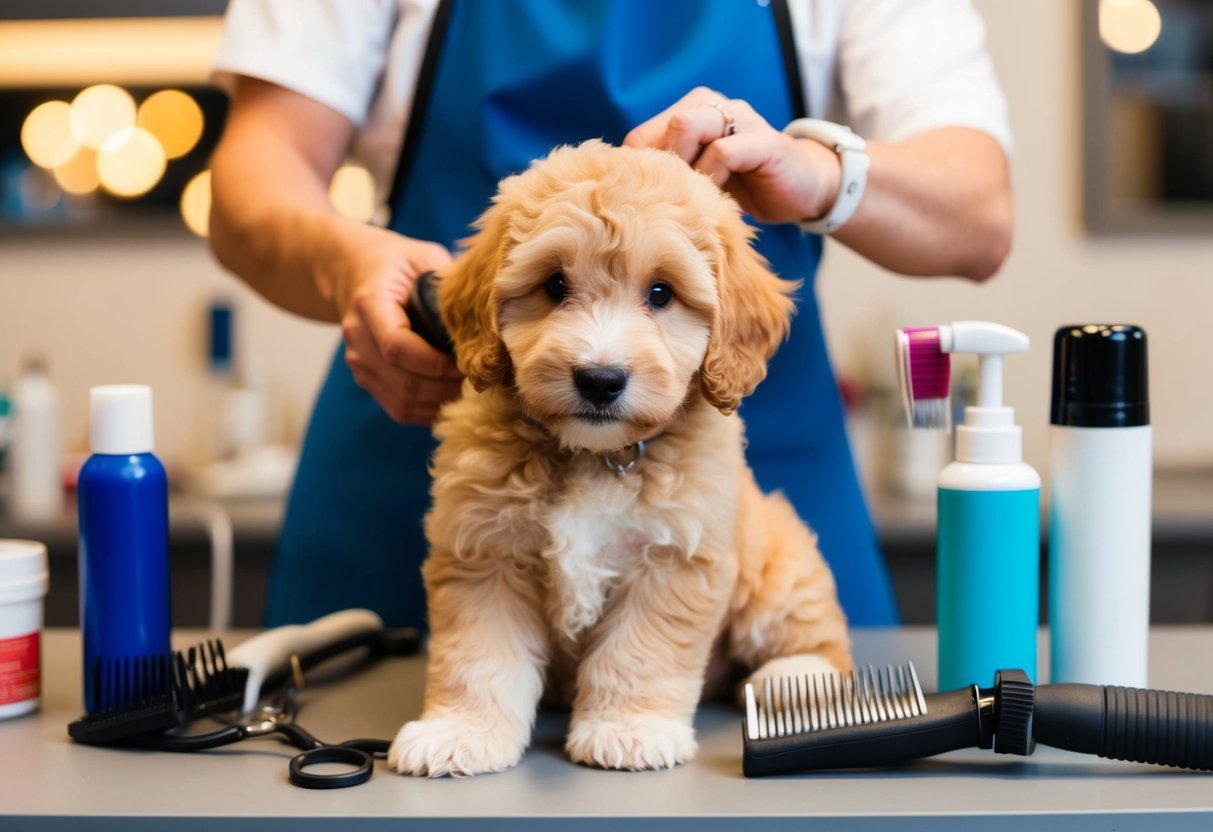
Grooming your Goldendoodle is important for their health and happiness.
Regular grooming helps prevent mats and tangles in their fur, which can lead to skin problems if not managed.
Keeping your dog’s coat clean also helps control shedding and reduces allergens in your home.
This is especially important for families with allergies since Goldendoodles are known to be hypoallergenic.
Routine grooming sessions allow you to check for any skin issues or parasites.
You can catch problems early before they become serious.
Brushing your Goldendoodle regularly can help to strengthen the bond between you and your pet.
It’s a great time for cuddles and affection, making grooming a fun part of your routine.
Additionally, grooming can make your dog feel more comfortable.
It helps them stay cool in warmer months and protects them from cold weather during winter.
Remember, a well-groomed Goldendoodle is a happy Goldendoodle.
So, keep those grooming tools handy and make it part of your caring routine.
5) Training Techniques
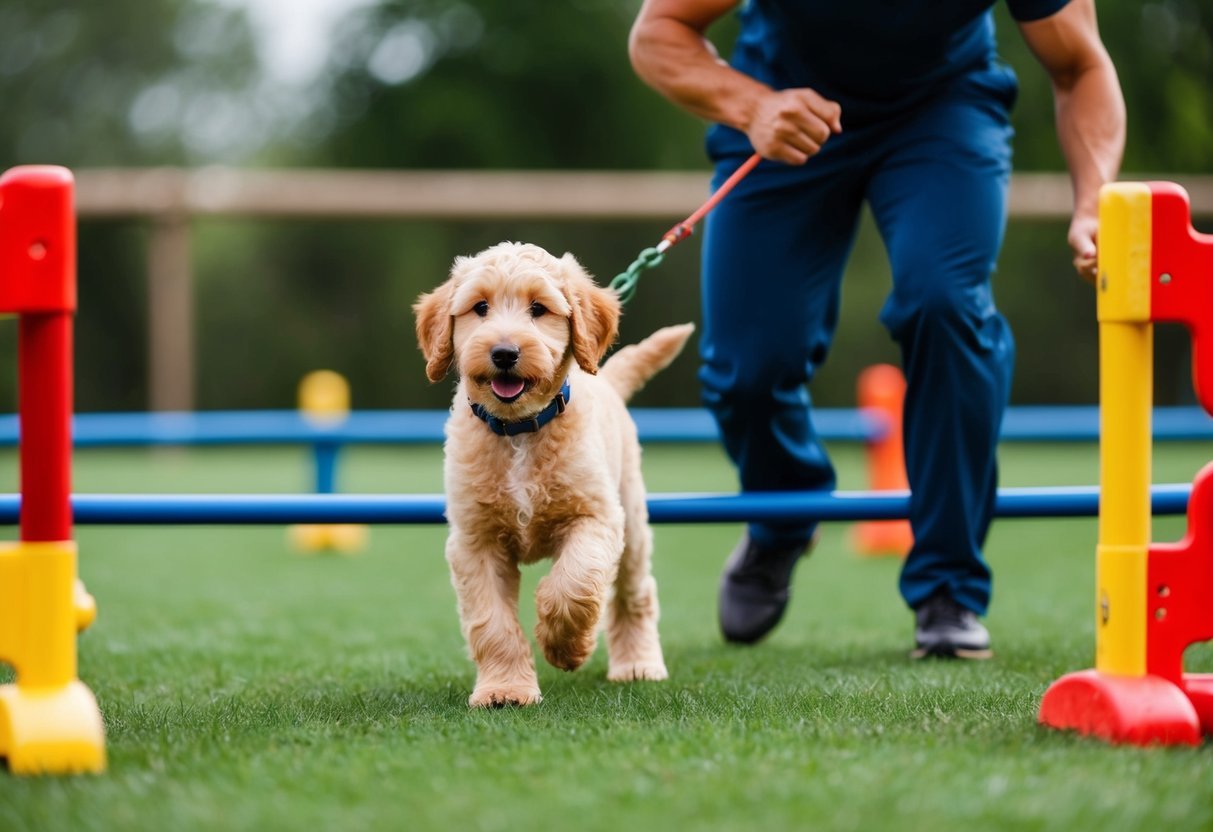
Training your Goldendoodle can be a fun and rewarding experience.
Start with basic commands like “sit” and “stay.” Keep training sessions short to hold their attention.
Positive reinforcement works best.
Use treats or praise to reward your pup for good behavior.
This helps them associate learning with something enjoyable.
Consistency is key.
Make sure everyone in your home uses the same commands.
This helps your dog understand what you expect.
Socialization is also important.
Expose your Goldendoodle to different people, pets, and environments.
This will help them grow into a well-rounded dog.
Don’t forget the importance of patience.
If your puppy struggles with a command, take a break and try again later.
Stress can lead to confusion and resistance.
For more tips on training techniques, check out Training Techniques for Goldendoodles.
This guide offers great advice from basic commands to advanced tricks.
Signs of Healthy Growth
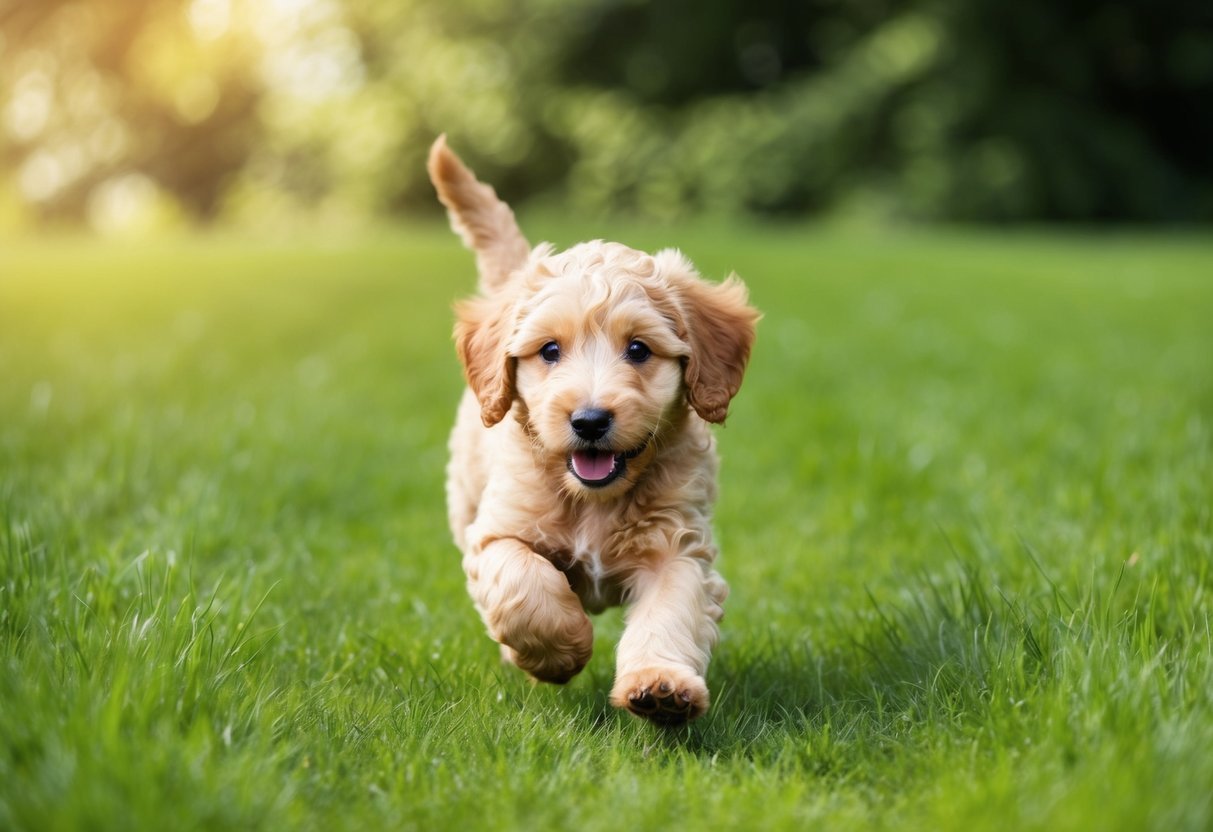
When your Goldendoodle is growing well, you’ll notice some key signs.
First, they should have a shiny coat.
A healthy dog usually has a smooth and vibrant coat without any bald spots or excessive shedding.
Weight gain is another sign.
Your pup should steadily gain weight according to their age and size.
Regular weigh-ins can help track their progress.
Pay attention to their energy levels too.
A healthy Goldendoodle is lively and playful.
If your dog seems less active, it might be worth checking in with a vet.
Also, watch their appetite.
Good growth means your pup enjoys their meals and eats regularly.
If they’re suddenly picky or not eating, it could be a concern.
Lastly, consider their growth patterns.
Goldendoodles typically grow in three stages.
If your dog is hitting milestones in size and development, that’s a great indication that everything is on track.
7) Dietary Supplements
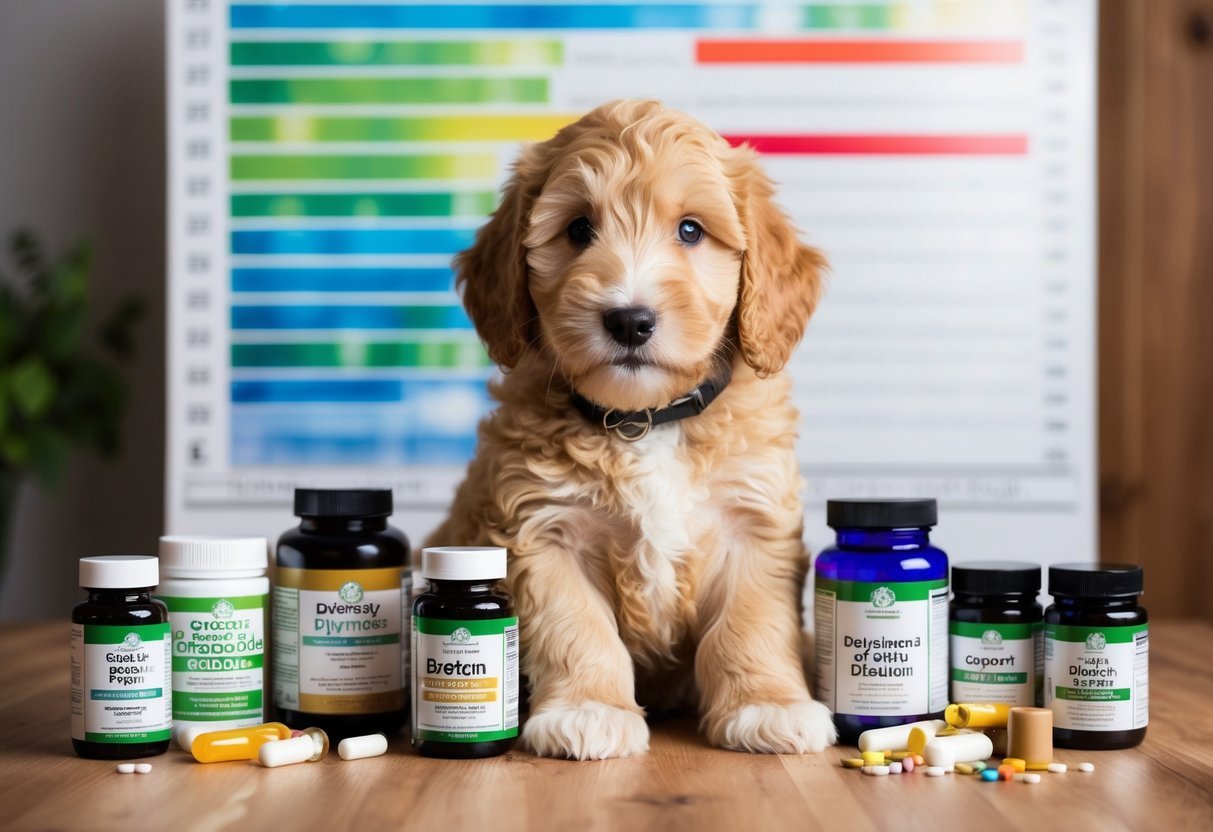
Adding dietary supplements to your Goldendoodle’s diet can be beneficial.
They can help support various health needs as your dog grows.
It’s important to choose the right supplements.
Consider vitamins that aid in coat health, joint support, and digestive health.
A good option is a whole-food supplement that provides essential vitamins.
These can help maintain a healthy immune system.
Before adding any supplements, check with your vet.
They can recommend the best products based on your dog’s specific needs.
This is especially important for senior Goldendoodles, whose nutrition may change over time.
Be cautious about dosages.
Too much of a supplement can be harmful.
Stick to the recommended amounts for your dog’s size and age.
Remember to look for high-quality ingredients.
You want something that is safe and effective.
Supplements should complement a balanced diet but not replace it.
Focus on overall nutrition to keep your Goldendoodle healthy and happy.
Understanding Goldendoodle Growth
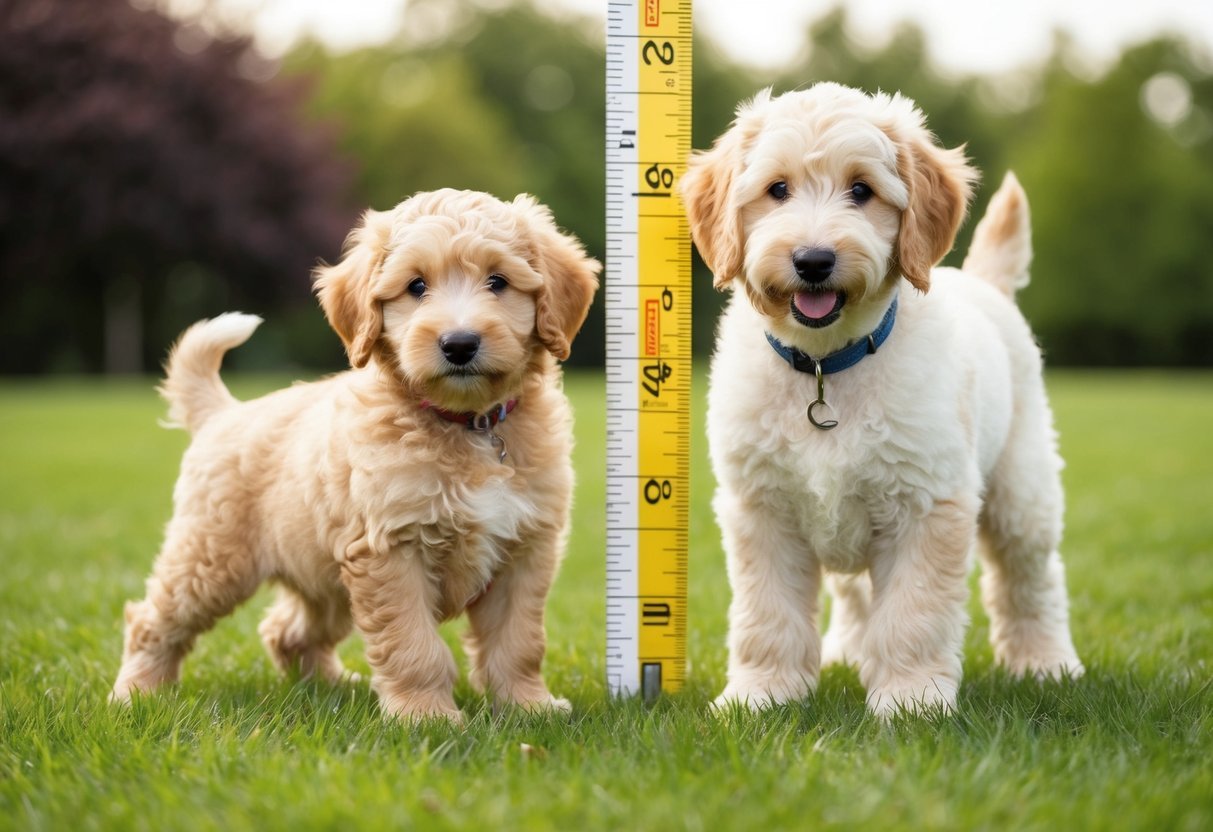
Goldendoodle growth is shaped by various factors.
By knowing these elements, you can better support your furry friend as they grow.
Let’s dive into the genetic influences and the stages of their development.
Genetic Influences
The genetic background of your Goldendoodle plays a huge role in their size and growth rate.
Since Goldendoodles are a mix of Golden Retrievers and Poodles, their size can vary based on the Poodle’s size.
Here are the main types:
- Standard Goldendoodle: Usually from Standard Poodles, these dogs can weigh between 50-90 pounds.
- Mini Goldendoodle: Resulting from Miniature Poodles, they generally weigh 15-35 pounds.
- Toy Goldendoodle: If you have a Toy Poodle parent, expect around 10-15 pounds.
Each dog will grow at different rates, so keep track of your pup’s growth.
Regular vet check-ups can help make sure everything is on track.
Stages of Development
Goldendoodles go through distinct stages in their lives that affect their growth.
Understanding these stages is key.
- Puppy Stage: From birth to about 2 years old. This is when they grow rapidly, needing special puppy food for proper nutrition.
- Adult Stage: Begins around 1-2 years old. Their growth slows significantly, and they’ll start to fill out.
- Senior Stage: Starting around 7 years old, their rate of growth and energy levels decrease. They require special care during this time.
It’s important to adjust their diet and exercise during each stage.
Knowing what to expect at each point helps you provide the best care for your Goldendoodle.
Factors Impacting Size and Weight
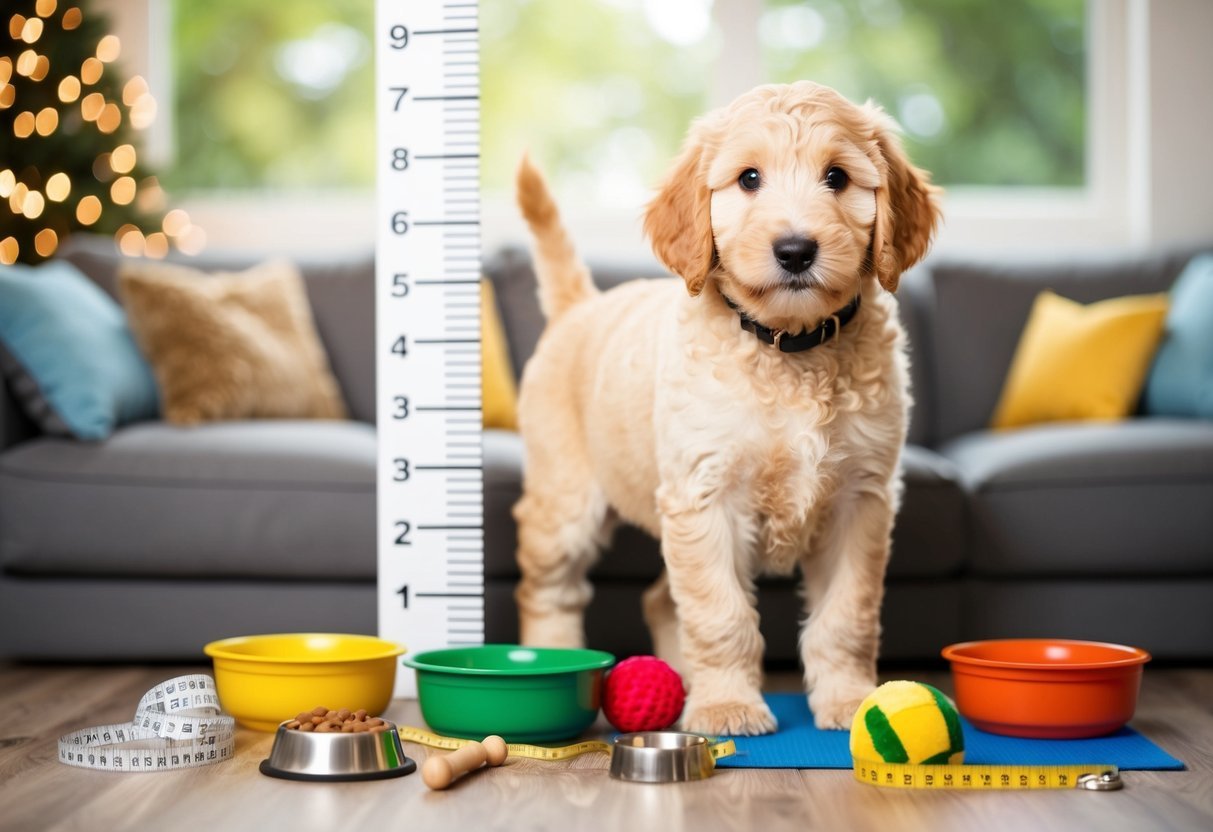
The size and weight of your Goldendoodle can change based on several important factors.
Understanding these aspects can help you provide the best care for your furry friend.
Diet and Nutrition
What you feed your Goldendoodle plays a huge role in its growth.
A balanced diet provides essential nutrients that help your dog reach its full potential in size and weight.
Look for high-quality dog food with real meat as the first ingredient.
It’s best to choose food designed for your dog’s specific size (mini, medium, or standard).
Portion control is also key.
Follow feeding guidelines based on your dog’s weight and age.
You might consider adding supplements like omega-3 for healthy skin and coat.
Be mindful of treats as well.
They can add extra calories quickly.
When choosing treats, go for healthy options like carrots or apples.
This keeps your pup happy and healthy without extra weight.
Exercise and Activity Levels
Regular exercise is crucial for your Goldendoodle’s growth and overall health.
Being active helps build muscle and maintain a healthy weight.
Make sure your dog gets daily exercise—aim for at least 30 to 60 minutes.
This could include walks, fetch, or playtime in the yard.
Activities that stimulate both the body and mind are ideal.
Age matters, too.
Puppies need more playtime to grow strong, while adult dogs benefit from structured exercise routines.
Choose fun activities that suit your dog’s energy level and size.
Always keep an eye on your Goldendoodle during exercise.
If you notice signs of fatigue, allow it to rest before continuing.
Keeping a good balance of diet and exercise will help your furry friend grow healthy and strong.
Frequently Asked Questions

As a Goldendoodle owner, you may have many questions about your puppy’s growth and development.
Here are some of the most common inquiries that can help you better understand your furry friend.
What are the key growth stages of a Goldendoodle puppy?
Goldendoodles go through several key growth stages.
These include the newborn stage, early socialization (3 to 7 weeks), and rapid growth phases from 3 to 10 months.
Each stage has its own unique milestones.
How can you track a Goldendoodle’s development week by week?
You can track your Goldendoodle’s growth by noting their weight and height regularly.
Using a growth chart can help you see how they compare to standard size ranges based on their age.
Keeping a weekly log can also help identify any significant changes.
What behavior changes can be expected as a Goldendoodle matures?
As your Goldendoodle matures, you might notice they become more independent and confident.
They may show different social behaviors, such as being more or less friendly with other dogs and people.
It’s common for them to test boundaries during this time.
At what age do Goldendoodles typically experience the most growth?
Goldendoodles usually experience the most growth between 4 and 10 months.
During this time, they can gain several pounds and grow in height.
This is a crucial phase where proper nutrition and exercise play essential roles.
What common behavior problems should Goldendoodle owners be aware of?
Common behavior problems include chewing, barking, and digging.
These behaviors often stem from boredom or lack of exercise.
Consistent training and socialization can help manage these issues.
What are some essential tips for taking care of a Goldendoodle puppy?
Feed your Goldendoodle a balanced diet to support their growth.
Regular exercise is important to keep them healthy and happy.
Socialization with other dogs and people is crucial for their development.
Don’t forget about grooming to maintain their coat and skin health.

